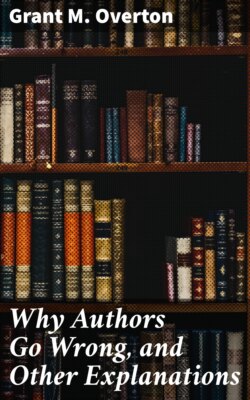Читать книгу Why Authors Go Wrong, and Other Explanations - Grant M. Overton - Страница 19
На сайте Литреса книга снята с продажи.
5
ОглавлениеTable of Contents
The most striking peculiarity of procedure in the Critical Court is with regard to what constitutes evidence. You might, in the innocence of your heart, suppose that a man’s writings would constitute the only admissible evidence. Not at all. His writings have really nothing to do with the case. What is his Purpose? If, as a sincere individual, he has anywhere exposed or stated his object in writing books counsel objects to the admission of this Purpose as evidence on the ground that it is incompetent, irrelevant and immaterial; and not sound Art. On the other hand if, as an artist, he has embodied his Purpose in his fiction so that every intelligent reader may discover it for himself and feel the glow of a personal discovery, counsel will object to the admission of his books as evidence on the ground that they are incompetent, irrelevant and immaterial; and not the best proof. Counsel will demand that the man himself be examined personally as to his purpose (if he is alive) or will demand a searching examination of his private life (if he be dead). The witness is always a culprit and browbeating the witness is always in order. I am a highbrow and you are a lowbrow; what the devil do you mean by writing a book anyway?
Before the trial begins the critic-judge enunciates certain principles on which the verdict will be based and the verdict is based on those principles whether they find any application in the testimony or not. A favorite principle with the man on the bench is that all that is not obscure is not Art. It isn’t phrased as intelligibly as that, to be sure; a common way to put it is to lay down the rule that the popularity of a book (which means the extent to which it is understood and therefore appreciated) has nothing to do with the case, tra-la, has nothing to do with the case. Another principle is that sound can be greater than sense, which, in the lingo of the Highest Criticism, is the dictum that words and sentences can have a beauty apart from the meaning (if any) that they seek to convey. And there really is something in this idea; for example, what could be lovelier than the old line, “Eeny, meeny, miny-mo”? Shakespeare, a commercial fellow who wrote plays for a living, knew this when he let one of his characters sing:
“When that I was and a little tiny boy,
With hey, ho, the wind and the rain,
A foolish thing was but a toy,
For the rain it raineth every day.”
And a little earlier in Twelfth Night:
“Like a mad lad,
Pare thy nails, dad;
Adieu, goodman devil.”
Which is not only beautiful as sound, but without the least sense unless it hath the vulgarity to be looked for in the work of a mercenary playwright.
